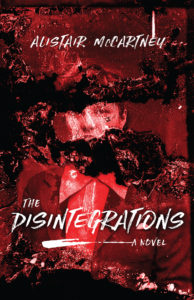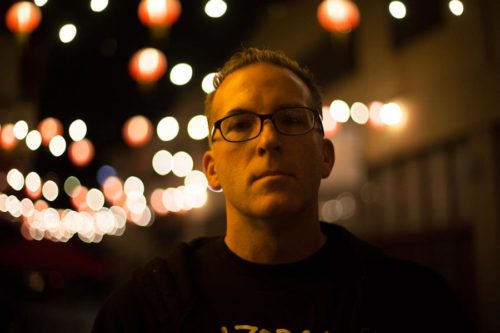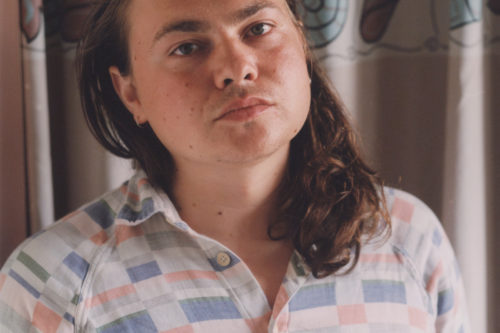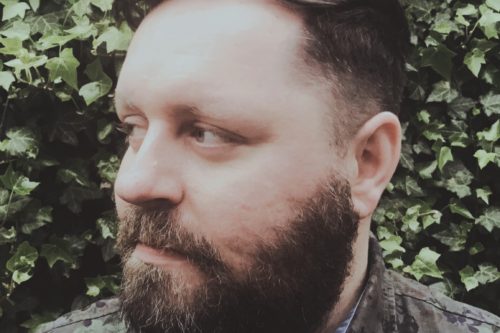 Alistair McCartney is a Los Angeles based author of two books, and most recently of The Disintegrations—a book that tackles the subject of death in all its abundant mystery and vague lore. The book is very much a Los Angeles book, as it sees its narrator find comfort and a narrative home base at Holy Cross Cemetery in Culver City; the final resting place of many of Hollywood’s most notable stars. The book often shifts from auto-fiction, to fiction and memoir, as McCartney takes us on a melancholic stroll of the afterlife and all the detritus and traces it has left behind in his own life. We recently talked to him about the book’s connection to music, his early influences, and LA as inspiration.
Alistair McCartney is a Los Angeles based author of two books, and most recently of The Disintegrations—a book that tackles the subject of death in all its abundant mystery and vague lore. The book is very much a Los Angeles book, as it sees its narrator find comfort and a narrative home base at Holy Cross Cemetery in Culver City; the final resting place of many of Hollywood’s most notable stars. The book often shifts from auto-fiction, to fiction and memoir, as McCartney takes us on a melancholic stroll of the afterlife and all the detritus and traces it has left behind in his own life. We recently talked to him about the book’s connection to music, his early influences, and LA as inspiration.
Angel City Review: Your recent book The Disintegrations uses the Holy Cross Cemetery in Culver City as a setting and pivot point for the various narratives that follow. Darby Crash, late singer of LA punk band the Germs is buried there, among others. You’ve also mentioned that their song “Land of Treason” was an inspiration while writing the book. Like Jim Morrison, Ian Curtis, and others, Crash’s death seems to precede him in an overly fetishized way. In which ways is his life and music suggestive of the kind of narrative you wanted to tell?
Alistair McCartney: “Pivot point” is a great, almost psycho-geographical way of describing how the cemetery in my book works narratologically. Anyway, yeah, Darby Crash was definitely a kind of icon for me as I wrote this book—in the specific sense of those Russian icons people are always praying to in old Russian novels. Or the way as teenagers we put posters up on our walls of rock idols we worshipped—I had one of Darby in this black mesh tank top. As for the particular song you mention, “Land of Treason,” I was particularly drawn to the end of the first verse:
I like a receptacle for the chosen dead, we find our bodies clawed. And with the scent of death, we find that we are not so very awed.
Just the idea, philosophically, that we set death up as grand thing, but in the end that grandiosity or sublime quality is just a facade. That idea resonates throughout the book. I wrote a lot more about Darby in an earlier version of The Disintegrations, and what I was interested in was the seemingly pure quality of his self-destructive nature, the almost saintly innocence of his fucked-up-ness. I think those qualities are mirrored in some characters in other stories, especially in “Robert” and also in the shadowy figure my narrator appears to be talking to.
ACR: Writing a book about death to the extent that you have, might seem like a massively melancholic undertaking to some. Some would make the argument that the real miracle of a book like this is that it was completed at all. A certain level of mental and emotional detachment must have been required to make your way through the book. Did music aid in getting you on track?
AM: Absolutely. Writing The Disintegrations was a really difficult undertaking, waking up to the fact of the book on a daily basis was often quite hard, and I think as you say it required that detachment, as well as a sheer stubbornness or obstinacy on my part. I listened to music constantly, not while writing, but during other parts of my day. I remember a certain period I was really struggling with the tone and form when I listened to Iceage’s Plowing into The Field of Love all the time, Scott Walker’s Soused, Bill Callahan’s The Doctor Came at Dawn and Apocalypse, just to name a few sources of inspiration. What really drew me to these records and so many others was their ability to take the melancholic but through sonic means turn it into something uplifting. I’m not sure if literature can do that, though on a syntactical, rhythmic level it can, especially when hearing the work read aloud. Regardless, music was an endless source of reaffirming what I was doing was okay.
ACR: Who were some of your literary and musical heroes growing up?
AM: Well, thinking specifically of my teenage years in high school, which were such a potent time to discover literature, lots of the usual suspects like Burroughs, Bataille, Rimbaud, Genet, Mishima, outsider writers who created intense fictive worlds, those books you hid from your parents down the side of your bed. And Kathy Acker—today is the 20th anniversary of her death and I’ve been thinking about her a lot. She’s one of those writers I had an immediate emotional relationship to. Reading Blood and Guts in High School while I was still at my Catholic boys high school blew my mind. I was probably even more passionate about music. My sisters introduced me to The Velvet Underground when I was really young. I loved Sonic Youth, Echo and the Bunnymen, Jesus and Mary Chain’s first two albums, My Bloody Valentine, Throwing Muses, Husker Du, just to name a few. The Smiths were major heroes; their first album came out the year I turned 13, and I think that to be a teenager while they were together was one of the most fortuitous timings in my life.
ACR: What was the first record you bought or heard that elevated music to a work of art for you?
AM: Wow, what a great question. I’d continue with my Smiths line of thought. Whenever they had a new single or album out, I’d head to Dada’s, a record store in downtown Perth, Australia, where I’m from. The cover art for each record they put out was a major part of the experience. And of course Morrissey’s lyrics were so thrilling on an emotional level, but also on a literary level. That fusing of the literary and the sonic was pretty unique. Though as I say this, I have to go back even earlier, to The Velvet Underground’s first album, which my sisters turned me onto when I was in fifth grade. Even at that age, when I was too young to fully take in the greatness of the album, I adored it. Some songs took more getting used to, but intuitively I tapped into the singularity of Lou Reed’s and John Cale’s vision, the way the album was like a novel, or each song was like a short story.
ACR: The Disintegrations seems to place a certain importance on narrative tone and style. How important is tone and style over plot in your works? Is tone something you seek out in your favorite music over elements like musicianship, craft, etc?
AM: Huh, that’s really interesting. Well, in terms of my own work, yeah, voice and tone and style and even more, atmosphere, are crucial for me. As a reader too. Plot is not something I think about too much, though I actually did for The Disintegrations, in stories like “Eun Kang and The Ocean” for example, and especially regarding the relationship between the narrator and the figure he’s talking to, but I kind of buried certain elements of the plot, or shredded it, so the reader has to tease it out for themselves.
In terms of music, I would say tone and atmosphere and style are also the main draw for me, though I’m not sure they can be totally separated from craft. I guess to go back to Darby Crash and The Germs, they can be—musicianship was the last thing that appealed to me about their music, it was all about the friction. I think I’m passionate about music though because in some ways all music values form over content.
ACR: Like many local writers, you were able to locate a level of quiet dread and despair that is very much part of the undercurrent of living in Los Angeles. You’ve lived in LA since the 90’s. At what point did this characteristic of LA start to manifest for you?
AM: I think pretty much straight away. Moving here from London where I lived after leaving Australia was quite a transition. I mean, in some ways LA was a lot easier than London, it reminded me much more of home geographically. But that quality of dread as you put it showed up really early in my perceptions, especially in the weird spatial quality of this city, its emptiness at night, something I really noticed as a non-driver, which I still am to this day. Also in the drifty, daydreamy nature of the city; everyone here is dreaming of something, beneath that laid back vibe those yearnings have an edge to them. My narrator very much participates in this collective dread. I’m sure reading also added to my perceptions. I worship at the altar of Joan Didion, who of course was key in constructing this fiction about LA.
ACR: Is there a piece of Australian music or literature that may have informed your writing style?
AM: I’m not sure other Australian literature has been much of an influence on my work, though readers may see influences I don’t see. I do love the great expansive novels of the Australian writer Patrick White, but I don’t think they’ve informed my style, except perhaps in a broader sense; someone once told me that Australian writers are drawn towards writing big books, in an attempt to cover up all the empty space of Australia. The Disintegrations ended up being a pretty slim novel (the earlier version was much longer, but I cut back ruthlessly), but I think like my first book, The End of The World Book, which was an encyclopedia of my obsessions, it was ambitious in scope; my goal was to write my own book of the dead.
ACR: What are you currently working on?
AM: I’m working in a very rough form on my third book, which will continue the sequence of books I’m constructing. I’m not ready to talk about its content, and I’m still figuring out the form, but I’m pretty excited about it. For one, unlike The Disintegrations, the subject of this book is something I know a lot about. I think I approach a book more like a musician approaching an album than a writer approaching their next novel. The Disintegrations was such a particular project, and after finishing it, I feel really freed up to pursue a really different path and sound.
The Disintegrations is available now via University of Wisconsin Press.



